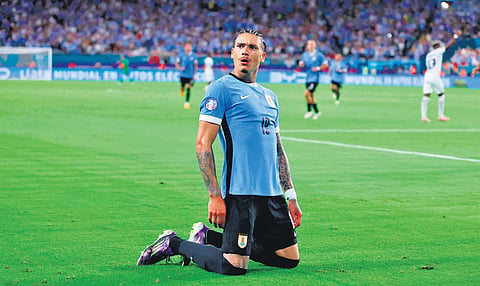

CHENNAI: LATE on Sunday night, Uruguay were putting the finishing touches on a commanding performance against Panama in their first match of the Copa America. Some familiar names did a lot of the running as the South Americans ran out 3-1 winners, with Darwin Nunez putting in a sort of performance not unlike when he wears the Liverpool jersey (five shots, one goal, two big chances missed).
Behind Nunez, the tireless Manuel Ugarte (PSG) and Fede Valverde (Real Madrid) were the building blocks. Down the wings, Nahitan Nandez (right back) and Matias Vina (left), who walked away with a goal and an assist, were a constant threat, buzzing around like super-charged mosquitoes waiting for any opportunity to bomb forward. The pair had passes into the final third and created six scoring chances. In short, it wasn’t a surprise when Vina, who plays his club football for Flamengo, walked away with the man of the match award.
What, though, was generally surprising was Uruguay’s very proactive brand of football. In a side known for grizzled veterans at the back (think Diego Godin), this was a huge departure from the norm. But then, when the man in the dugout is Marcelo Bielsa this is the norm. High on energy and adrenaline, constant pressing, vertical passing, getting the full backs into play... it was a trademark display from a Bielsa-coached side. The most commendable part of the display was the team’s buy-in to Bielsa’s very unique methods.
His demands are legendary (when Everton approached him post his stint with Leeds, the Argentine wanted to first take control of the youth side before taking charge of the senior set-up six months down the line). Anyway, most international managers prefer to play a reactive brand of football as it’s very hard to coach a philosophy that’s dependent on high press and full of attacking verve. Because they don’t have the luxury of training the players round the year, most of them focus on the defensive side of the game before building attacking cohesion and patterns.
But then Bielsa is unlike most coaches. He’s so influenced by his dogma, it’s usually his way or the highway (thanks to this philosophy, he has faced issues at club level so far). Uruguay, though, have adopted his way and the proof has been there since he was appointed to the post last May. The South Americans, after enduring a below par World Cup in 2022 (they failed to get out of their group), wanted a shock. Bielsa has given that to them, famously beating Brazil and Argentina in the ongoing World Cup qualifiers.
In the process, he has also channelled Nunez’s chaos (he’s the leading goal-scorer in CONMEBOL’s qualifying stage with five) while managing to retain his enigma. His body of work (Pep Guardiola and Zinedine Zidane, to name two highly successful modern coaches, are big fans of it) hasn’t delivered the big titles (one of his biggest, till date, came with the Argentine side at the 2004 Olympics) but do not rule out a proper tilt at this year’s Copa. Argentina, most of whom tasted global gold in Qatar in 2022, are the favourites but their neighbours aren’t behind by a lot. Brazil can never be ruled out of contention but this iteration is in transition.